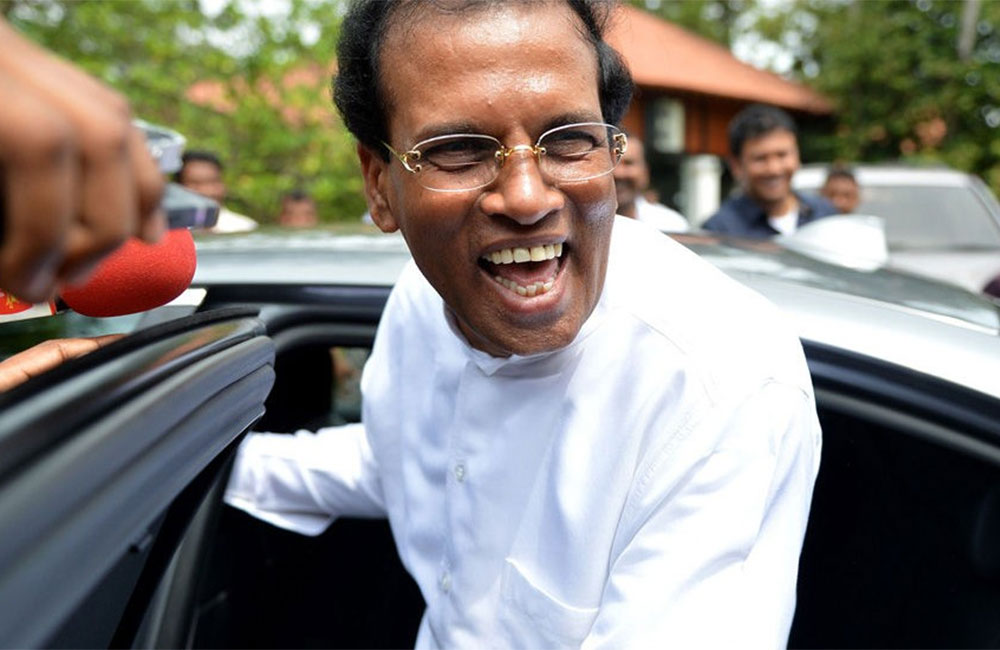President Maithripala Sirisena has dissolved Parliament, a short while ago, in stark violation of the country’s constitution.
Sirisena, when he signed the gazette announcing the premature dissolution of the legislature, grossly violated the provisions of the 19th Amendment to the constitution – which he architected in April 2015.
Strong arguments have been presented against the dissolution of Parliament saying the President has no constitutional power to do so, before four and a half years into a Parliamentary term, as stipulated by the 19th Amendment.
Commenting on the grotesque illegality of a premature dissolution of Parliament, UNP Parliamentarian Dr. Jayampathy Wickramaratne PC, a co-author of the 19th Amendment said, “The Nineteenth Amendment, which was passed with just one Member of Parliament opposing it, reduced the term of Parliament to five years. Provisions that Supreme Court held required a Referendum were amended or dropped. Article 70 of the amended Constitution restricted the power of the President to dissolve Parliament. It now provides that “the President shall not dissolve Parliament until the expiration of a period of not less than four years and six months from the date appointed for its first meeting, unless Parliament requests the President to do so by a resolution passed by not less than two-thirds of the whole number of Members (including those not present), voting in its favour.” Thus, Parliament can now be dissolved by the President in the first four and a half of years of its term only if 150 Members of Parliament so request by a resolution passed in Parliament. The wording is clear and unambiguous.
Those who argue that the President’s power to dissolve Parliament is unlimited point out to Article 33 (2) (a) which states: “In addition to the powers, duties and functions expressly conferred or imposed on, or assigned to the President by the Constitution or other written law, the President shall have the power–
(a) …..
(c) to summon, prorogue and dissolve Parliament…”.
It is argued that Article 33 (2) (a) overrides Article 70. Article 33 only declares some of the general powers of the President. The manner in which and the conditions under which that power of dissolution can be used are given in Article 70. That Article states that dissolution shall be by Proclamation. Then it goes on set down the clear limitation that the President cannot dissolve for four and a half of years unless Parliament so requests by a two-thirds majority. Any power that the President claims under Article 33 (2) must not be in violation of express provisions of the Constitution. The words “In addition to the powers, duties and functions expressly conferred or imposed on, or assigned to the President by the Constitution or other written law…” cannot be used to override expressly laid down constitutional limitations on the powers of the President.
Take Article 33 (2) which provides in sub-paragraph (f) that the President has the power “to keep the Public Seal of the Republic, and to make and execute under the Public Seal, the acts of appointment of the Prime Minister and other Ministers of the Cabinet of Ministers, the Chief Justice and other judges of the Supreme Court, the President of the Court of Appeal and other judges of the Court of Appeal, and such grants and dispositions of lands and other immovable property vested in the Republic as the President is by law required or empowered to do, and to use the Public Seal for sealing all things whatsoever that shall pass that Seal…”
Meanwhile, addressing a lawyers’ gathering at New Town Hall, in Colombo, this afternoon, TNA Parliamentarian M.A. Sumanthiran PC said, Parliament cannot be prorogued or dissolved due to the whims and fancies of one individual.
“The Constitution is clear on Parliament being the place to decide who is PM but Parliament is prevented from doing so,” he added. (Colombo Telegraph)

Leave your comments
Login to post a comment
Post comment as a guest